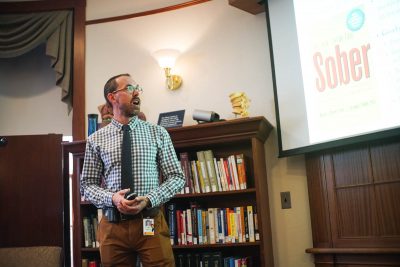
The U.S. Department of Health and Human Services’ Substance Abuse and Mental Health Services Administration dedicates the month of September to National Recovery Month for those who suffer from addiction. Massachusetts General Hospital joined in to recognize recovery month, and on Monday, hosted a talk about the impact of marijuana on developing brains.
Speakers at “Engaging Youth in Treatment of Legalized Marijuana” offered advice on how to appropriately initiate family discussions if a loved one is struggling and provide treatment options for youths.
The hospital hosted a series of educational events to bring awareness to support services throughout National Recovery Month. The talk was organized by MGH’s Substance Use Disorders (SUDs) initiative.
“SUDs is a hospitalwide initiative that was created four years ago, making quality treatment accessible for patients struggling with chronic substance use disorder,” explained Elizabeth Powell, manager of the program.
James McKowen, licensed psychologist and clinical director of MGH’s Addiction Recovery Management Service, led Monday’s talk. He said that an estimated 70 percent of SUDs are onset in adolescence, often developing into persistent relapsing conditions in adulthood.
McKowen, who received his Ph.D. at Boston University, said nine percent of people who begin using marijuana in adulthood become dependent, but then, this risk rises to 17 percent if they begin smoking as teenagers. Heavy marijuana use over the course of several years can impact executive functioning, which includes attention, problem solving, memory, emotion regulation and IQ decline, according to McKowen.
“These problems typically emerge in their late 20s, in particular for those who start smoking before age 16 and continue to smoke, even once a week, for four or five years,” McKowen said.
McKowen explained this decline in executive functioning may lead to worsening mental health, increased risks of dropping out of school and lower employment status. He said users may also face increased risks of cancer, depending on the substances used.
MGH’s Center for Addiction Medicine found data showing drug abuse can result in “changes in the size of certain parts of the brain that may impact the process of pruning” McKowen explained.
According to an article in Scientific American, pruning is the natural process of eliminating neurons that are damaged or no longer needed and is an important step in neurological development from childhood to adulthood. Pruning helps to maintain efficient connections within the brain and develop complex cognitive skills.
“This research is still preliminary and requires long-term studies, but I think the general consensus is that what we see is concerning right now in terms of what is happening in the minds of youths,” McKowen said.
McKowen advised parents concerned that their children are at risk of developing a marijuana dependency to set boundaries and consider the frequency of use in context.
“Are you noticing declines in grades?” McKowen said. “Are they displaying irritability and changes in their mood? Are they limiting their activities? We want to also look at behavioral changes in different areas of their life before we say that just smoking pot means you have a problem.”
In November 2012, Massachusetts became the 18th state to legalize medical marijuana use for patients with debilitating medical conditions who receive permission from their physicians. Four years later, this legislation expanded to permit recreational marijuana use for adults ages 21 and over.
Physicians and public health experts worried that this ruling would provide youth with easier access to marijuana and, therefore, increase the likelihood of dependency issues.
Viable options for youths in need of help include cognitive behavioral therapy and motivational interviewing. According to McKowen, no medicines currently target marijuana dependency in the way some help with alcohol and opioids, but emerging evidence supports the use of an over-the-counter substance called N-Acetylcysteine.
“Efforts should be starting in middle school to try and reduce the next wave,” McKowen said. “Just providing information on drug use is not effective.”
One past information campaign — Drug Abuse Resistance Education program — was taught in schools across the nation from 1983 to 2009, yet according to an article in Scientific American, studies show that lecturing students on the dangers of drugs does not deter substance use.
“The D.A.R.E. program was used in my school, but I don’t think it made that much of a difference,” said Hannah Collins, a freshman in the College of Arts and Sciences. “I feel like there was an opportunity to take advantage of the program, but most kids just thought it was silly and didn’t really learn anything from it.”
Instead, drug prevention efforts are now shifting toward interactive lessons that develop communication and decision-making skills.
“They should be providing information on other ways someone can get rewards, building activities and making sure kids are connected with their community,” McKowen said.



























































































































